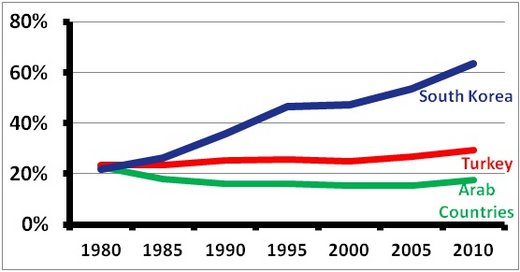TEPAV Articles
- [Archive]
Turkey in between Arab Countries and South Korea: A picture of mediocrity? 28/11/2011 - Viewed 2596 times
If I was to draw a picture worth a thousand words, it would be the graph below. It shows per capita income in Turkey, Arab countries and in South Korea in proportion to that of the US, the largest economy in the world. It starts in 1980 (the year of my birth) when a Turk, an Arab and a South Korean had the same per capita income, which was one-fifth of an American’s. By 2010, income per capita in proportion to that of the US increased to 70 percent in Korea, 30 percent in Turkey and dropped to 19 percent in Arab countries.
Per capita GDP in Turkey, South Korea and Arab Countries in Proportion to US, 1980-2010, by PPP

Source: World Bank, World Development Indicators
I don’t know whether money brings happiness, but I feel as though this graph depicts success for South Korea and gloom for Arab countries. For Turkey, the picture is one of mediocrity.
Let us first turn our attention to the gap between Turkey and Arab countries. The gap widening in favor of Turkey explains where it went right and Arab countries faltered. Arab countries have hardly implemented anything like the liberal reforms that Özal initiated in Turkey in the 1980s. Özal’s reforms gained pace with the European Union membership process and have been carried on by the AKP government since the 2001 crisis. These “first generation reforms,” based on the operation of the free market and integration into the global economy, made the average Turk $5,000 richer than the average Arab. While we today, are closing its income gap with the US, our Arab brothers are faring worse every day. They fail to benefit sufficiently from global trade and finance flows. I believe that this is what gave impetus to the Arab Spring.
My second point is on the widening gap between South Korea and Turkey. During the 1980s, the average Turk and a South Korean had about the same income of $5,000, whereas today, there is a yawning $17,000 gap between the two. Look down this gap, and you’ll see what South Korea has done Turkey hasn’t. Turkey suspended the “second generation reforms” that would enhance the rapid growth capacity of its economy. It met the minimum conditions of global economic integration and does not seem to be interested in pushing the boundaries of its economic model.
Evidently, the economic histories of Korea and Turkey cannot be compared within a short analysis. The development adventures of the two countries, however, raise highly interesting questions about the sequence of political and economic reforms. For instance, in the 1960s, coup d’états were staged in both countries. After its coup, Turkey set out on a path of undulating democracy and economic development, whereas Korea completed its economic transformation under an authoritarian regime. I am, of course not advocating authoritarianism; however, while following the debates on the Arab Spring, the following thought has occurred to me: If Egypt is destined to suffer an authoritarian regime, let it be in the Park Chung Hee style rather than the Hosni Mobarak variety.
My third point is about what to do next. We have to tear down the picture of aching mediocrity. I wrote a commentary about the medium-term program announced last year* and complained that Turkey had neither a concrete plan nor any enthusiasm about the future. I see the same mediocrity in this year’s program, and frankly, am not thrilled to write about it.
It seems to me that we have to plan on running a marathon, but we are too busy deciding on what color sneakers to buy.
Esen Çağlar, TEPAV Economic Policy Analyst, http://www.tepav.org.tr/en/ekibimiz/s/1025/Esen+Caglar














